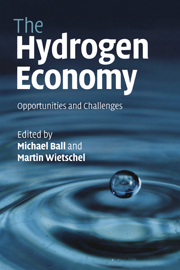Book contents
- Frontmatter
- Contents
- List of main contributors
- Preface
- Acknowledgements
- List of abbreviations
- 1 Scope of the book
- 2 Why hydrogen?
- 3 Non-renewable energy resources: fossil fuels – supply and future availability
- 4 Non-renewable energy resources: nuclear fuels
- 5 Assessment of the potentials for renewable energy sources
- 6 Carbon capture and storage
- 7 Energy-chain analysis of hydrogen and its competing alternative fuels for transport
- 8 Hydrogen today
- 9 Fundamental properties of hydrogen
- 10 Hydrogen production
- 11 Hydrogen storage
- 12 Hydrogen distribution
- 13 Key role of fuel cells
- 14 Hydrogen-infrastructure build-up in Europe
- 15 Building a hydrogen infrastructure in the USA
- 16 Hydrogen and the electricity sector
- 17 Hydrogen corridors
- 18 Macroeconomic impacts of hydrogen
- 19 Sustainable transport visions: the role of hydrogen and fuel-cell vehicle technologies
- 20 Energy-efficient solutions needed – paving the way for hydrogen
- 21 The future of hydrogen – opportunities and challenges
- Further reading
- Index
- References
9 - Fundamental properties of hydrogen
Published online by Cambridge University Press: 22 January 2010
- Frontmatter
- Contents
- List of main contributors
- Preface
- Acknowledgements
- List of abbreviations
- 1 Scope of the book
- 2 Why hydrogen?
- 3 Non-renewable energy resources: fossil fuels – supply and future availability
- 4 Non-renewable energy resources: nuclear fuels
- 5 Assessment of the potentials for renewable energy sources
- 6 Carbon capture and storage
- 7 Energy-chain analysis of hydrogen and its competing alternative fuels for transport
- 8 Hydrogen today
- 9 Fundamental properties of hydrogen
- 10 Hydrogen production
- 11 Hydrogen storage
- 12 Hydrogen distribution
- 13 Key role of fuel cells
- 14 Hydrogen-infrastructure build-up in Europe
- 15 Building a hydrogen infrastructure in the USA
- 16 Hydrogen and the electricity sector
- 17 Hydrogen corridors
- 18 Macroeconomic impacts of hydrogen
- 19 Sustainable transport visions: the role of hydrogen and fuel-cell vehicle technologies
- 20 Energy-efficient solutions needed – paving the way for hydrogen
- 21 The future of hydrogen – opportunities and challenges
- Further reading
- Index
- References
Summary
With the expected increasing significance of hydrogen as a universal chemical and as an energy vector, its physical and thermodynamic properties are undergoing extensive investigation. To provide a basis of understanding for the themes covered in the remainder of the book, this chapter briefly describes the fundamental properties of hydrogen.
Discovery and occurrence
Named by a French chemist, Lavoisier, hydrogen (H) is the first chemical element of the periodic table of elements with an atomic number of one. At standard temperature and pressure, hydrogen is a colourless, tasteless, odourless and easily flammable gas. With its atomic mass of 1.00797 g/mol, hydrogen is the lightest element. The British scientist, Henry Cavendish, was the first to identify H as a distinct element in 1766, publishing precise values for its specific weight and density (NHA, 2007).
Hydrogen is also one of the most abundant chemical elements in the Universe (70–80 wt.% H2 content); more than 50 wt.% of the Sun consists of hydrogen. However, on Earth it mostly occurrs naturally in the form of chemical compounds, most frequently water and hydrocarbons. As a gas in its free state, hydrogen is very rare (1 ppm by volume in the Earth's atmosphere), owing to its light weight, and it can only be found in natural gas and some volcanic gases, as well as trapped in small quantities in some minerals and rocks (Ullmann, 2003).
- Type
- Chapter
- Information
- The Hydrogen EconomyOpportunities and Challenges, pp. 271 - 276Publisher: Cambridge University PressPrint publication year: 2009
References
- 2
- Cited by

